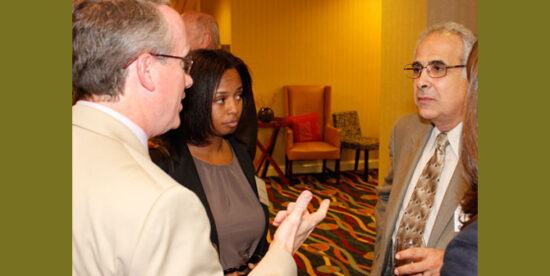
John Zogby recently concluded a book tour around the country, speaking at events in partnership with Global Ties member organizations, including at the Diplomacy Begins Here summit in Huntsville, Alabama in November. He spoke to us about his book, First Globals: Understanding, Managing, and Unleashing Our Millennial Generation and what he learned about millennials and the Global Ties network during his tour.
You just visited 15 cities in the United States to promote your book. What conclusions have you drawn?
John Zogby: I spoke with Jennifer Clinton before I embarked on my book tour. I have had a strong interest in international exchanges for decades. The International Visitor and Leadership Program is “the Lord’s work,” in my view. I really went on tour for the purpose of seeing how the two mix. Millennials are the first generation of Americans to be born and raised around the Internet. How do they relate to a program that relies more on handshakes than Tweets or Facebook likes? I hoped to find the answer.
What are your conclusions?
JZ: Very positive, thanks to what I saw. I have no concerns about “passing the torch” to the millennial generation.
What’s special about them?
JZ: Millennials are global. They don’t consider a class of people to be “the other.” They are more likely to play soccer than baseball. Practically all the millennials I met were raised in integrated neighborhoods. They want to change the world and don’t understand why problems endure for as long as they do. Millennials really enjoy actions that go outside of channels. Perhaps most importantly, they are entrepreneurial and depend on themselves, or wish to be seen as mavericks.
They want to change the world and don’t understand why problems endure for as long as they do.
Some say millennials prefer emails and text messaging to people-to-people interaction. What has your experience been?
JZ: I don’t think that’s true. Millennials understand how the bonds between people require a handshake, or something akin to it. Herein lays the strength of the International Visitor and Leadership Program. It produces those ties in ways online technology cannot match. Millennials I’ve spoken to understand this.
About those International Visitors who travel to the United States: what do they get out of the program?
JZ: They experience real people-to-people diplomacy. Don’t forget the benefits to Americans who experience foreign cultures though the visitor program.
What are those benefits?
JZ: Consider the part of the world outside of the United States I know best, the Middle East. Polling there tells us that while Arabs don’t like U.S. policy, they absolutely respect and admire the American people. I followed the Tunisian revolution in 2011, where the Arab Spring arguably began. Young people there wanted to know if American kids admired them for ridding their country of a dictatorship. They really care how we see them. There is more good will out there towards the U.S. than you would imagine.
What does the International Visitor and Leadership Program accomplish?
JZ: A lot. And those community-based organizations… they do the most.
How?
JZ: Here’s an example. I recall a visitor from a Central Asian state discussing the plight of orphans in his country while speaking in Albuquerque, New Mexico. They lacked textbooks or school supplies, something like that. Almost immediately, the good people of Albuquerque established a nonprofit that brought these things from America to the visitor’s homeland. Grassroots diplomacy of this sort happens all the time. While the headlines for such a story may be fleeting, the amount of good will generated is huge.
Grassroots diplomacy [of this sort] happens all the time
How can millennials help? They seem to be the most indebted generation ever!
JZ: They won’t be in debt forever. And a 20 dollar contribution can go a long way. It could turn into 50 dollars tomorrow.
Any last words about the International Visitor Leadership Program?
JZ: I would like our country to reaffirm its commitment to the principles that brought forth the International Visitor and Leadership Program some 75 years ago. I am enjoying my work with Global Ties U.S. and have only good things to say about its personnel and leadership. I have tremendous respect for the community-based organizations I met on my current tour and during previous trips throughout the United States. Though I conduct polling on national elections and about attitudes held toward us in foreign countries, I’m really an “American heartland” kind of guy. I live in Utica, New York, where I was born and raised.
John Zogby, a member of the Global Ties U.S. Board of Directors, is an internationally respected pollster, opinion leader, best-selling author, and founder of the “Zogby Poll” and the Zogby companies, where he serves as senior analyst. Called “The Prince of Polling” by political strategist Mary Matalin, his interactive methodology is a leader in his field. He is the author of the best-selling The Way We’ll Be: The Zogby Report on the transformation of the American Dream (Random House, 2008) and co-author of First Globals: Understanding, Managing, and Unleashing Our Millennial Generation (with Joan Snyder Kuhl). Zogby writes weekly columns on Forbes.com and contributes a weekly Obama report card to The Washington Examiner’s Washington Secrets. He is also a founding contributor to The Huffington Post. Zogby’s analytical expertise has also been published on the opinion pages of the New York Times, Wall Street Journal and Financial Times. He has polled and consulted for a wide spectrum of business, media, government and political groups including Coca-Cola, Microsoft, CISCO Systems, St. Jude’s Children’s Research Hospital and the US Census Bureau. He is presently chairman of the capital campaign on behalf of Mohawk Valley Community College (where he taught in the 1970s), and serves on the boards of the Arab American Institute, Upstate Venture Connect (which links young entrepreneurs with venture capital in Upstate New York), and Freedom Guide Dogs. Zogby is chairman of Sudan Sunrise which supports educational programs and reconciliation efforts in that country.
